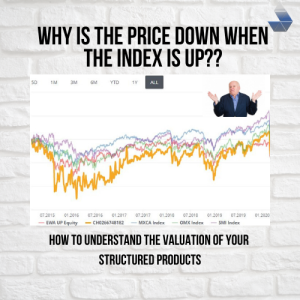
- 05Mar2020
-
Why is my Structured Note value down when the Assets are up?

Well, unlike Funds, any costs associated with setting up and clients buying into a Structured Note does need to come into consideration. These costs are normally factored into the first 6 months or so. This is unlike many Funds that have an exit penalty spread between 5 and 7 years. So this is only a factor early on in a Structured Note. So why then does the product not track for example, the underlying assets or at least the worst performing asset?
Think about this from the Banks point of view for a minute: “What effect does someone selling have on us??”
I have covered initial setup costs so not more needs to be said. However, I would like to point out that if you had spent a lot of money setting up an investment (Structured Product) and someone sold the next week, why should the Bank take a hit on this? Is that really fair? It would be like buying a new car, driving 10k then handing it back to the dealer expecting a full refund.
Other factors to consider is the Banks balance sheet. A few years ago Commerzbank (a German Bank) had their investment rating downgraded. They launched an aggressive campaign to bring new assets to the Bank. A lot of this money was raised via Structured Notes. Their grade was improved after some time and they are happily A Grade again. If large amounts of people were to sell their investments at the same time, the Bank could once again have their credit rating looked at. So during chaotic global crisis (like COVID-19), the Banks can lower the value of a Structured Note to deter mass selling. Those that panic and still choose to sell essentially make the Bank a little more money. Money that is needed to keep their book of business in good standing with Moody’s and Fitch.
Does the movement of assets have any sway on the pricing? Of course they do! But normally just on the downside. If the assets slide, the value of the Note will also slide. If the Assets are massively up e.g. 15% each above the start, unfortunately the value of the Note will not go higher than the value of the next Coupon payment i.e. if the next Coupon is 2% next month, the Note will unlikely be valued at more than 101% regardless of asset performance. In the case of an almost certain Autocall, the Bank may try to tempt you to sell by putting the value at 101.5% as this would save them having to pay out an extra 0.5% when the product Autocalls.
At the end of the day, the Bank owns the product and can sell for what they like. However, if they didn’t give a fair enough value on the secondary market, I am pretty sure that people would be less likely to use these investments. The moral of the story is that if you need to sell early, you can. You will most likely get back slightly less than if you held the investment to term. The great thing about Structured Notes is that if you hold the product, the Bank have to honour the Terms at maturity. So don’t panic sell!!
Just like a Fund or Stock, if you sell when Markets are down, you’ll get back less than you bought for. Unlike Funds or Stocks, if you hold a Structured Note when markets are down, then you still have 100% of your money unless the value has dropped below the Barrier.
e.g.
Example 1: You buy into the S&P 500 Index and it drops 15%. Direct investment you’d have lost 15%. With a Structured Note, you’d have lost nothing.
Example 2: You buy into the S&P 500 Index and it drops 45%. Direct investment you’d have lost 45%. With a Structured Note, you’d have lost 45%. This is exactly the same but you’d at least be protected for a good chunk of the downside in a Structured Note, and a Fund would have to recover completely. A Note only has to get above the barrier to return 100%.
These are general rules for the Value of a Structured Note. There will often be glitches and mistakes in pricing which is just normal human error. See a video here on how NEBA took advantage of one such Glitch with the potential to earn clients over 300% in 4 years:
NEBA are happy to help put a balanced portfolio together to fit the clients attitude to investing.
Visit www.nebafinancialsolutions.com to see our Structured Products and UCITS Funds
- 5 Mar, 2020
- NEBA Financial Solutions
- 0 Comments

Comments